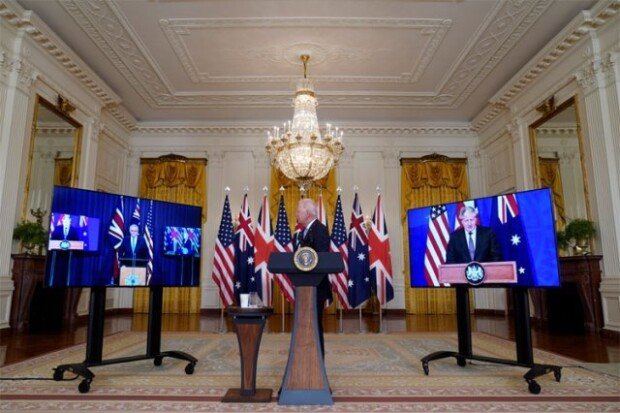Are we heading towards a new Cold War?
Are we heading towards a new Cold War?
Posted October. 01, 2021 07:31,
Updated October. 01, 2021 07:31


The key characteristic of the foreign policy of the Joe Biden administration is to apply strategic pressure on China. President Biden is the most well-informed of China than any other former presidents and is adapted to dealing with China. Nonetheless, he took office just as the nation was stricken by COVID-19 and embroiled in the partisan divide between Republicans and Democrats, which led to social and political divisions in American society. The Biden administration inherited the Trump administration’s unyielding and uncompromising approach to diplomacy with China. It is literally “Trumpism without Trump.”
Chinese President Xi Jinping is taking a tough stance as well. Xi stressed on several occasions that China must “boldly and courageously” fight against the U.S. pressure. Amid the escalating tension between the U.S. and China, a thorny question emerges: is the U.S.-China relationship heading towards a new Cold War?
A new cold war would certainly not be the priority choice of the American political establishment. Many countries do not want to choose one over the other as they have forged economic ties with both the U.S. and China through trade. If the rivalry between the two countries intensifies to the point of a new Cold War, the world will be divided, which would be of no benefit to the majority of the countries. Even if Washington braces for a new cold war, it would still be unconvinced how many countries would side with the U.S. to stand against China.
It is even more obvious that China does not want a new Cold War. The Chinese economy grew quickly, but the nation’s economy as a whole still stands at the lower middle class. China’s key objective is not to challenge the U.S.’s hegemonic position but to pursue continued economic growth so that it would become one of the world’s leading economies 20-30 years later. A new Cold War would take a toll on China’s economic growth and might even rupture China’s advancement unseen in history. No matter how strongly the Chinese leaders argue the importance of “boldly and courageously” fighting against the foreign power, it is pragmatism that underpins the Chinese political system. The competition between the U.S. and China must be practical and cooperative.
What is problematic here is an accidental consequence arising from repetitious confrontations rather than the intended outcomes of the competition, most representatively, concerning Taiwan and the South China Sea. These two potentially explosive issues must be delicately dealt with to avoid rapid escalation of the U.S.-China rivalry into a new Cold War.
Like the Trump administration, the Biden administration is tilting towards a new approach toward Taiwan, backed by Japan’s strong support. The U.S. has maintained unofficial diplomatic relations with Taiwan by upholding the “One China” principle. However, the Taiwan issue has become a crucial leverage for the U.S. to check China. Japan is also deliberating on the exercise of the right to self-defense under the pretext of the Taiwan issue. Although the U.S. and Japan have not approved of the sovereignty and independence of Taiwan, it seems obvious that they have transitioned into the “One China One Taiwan” policy. From China’s vantage point, such change in the attitudes of the U.S. and Japan is an unanticipated regression. China maintains a hardline attitude towards the Taiwan issue.
Disputes over the South China Sea are also crucial. The U.S. takes it seriously that the Chinese army becomes capable of taking control of the South China Sea. To contain China, the U.S. is holding joint military drills with Japan, Australia, and India and urging the European nations including the U.K., France, and Germany, and Canada to deploy their warships and aircrafts to the region. If confrontations between the U.S. and China in the South China Sea are frequented, thereby leading to “misfiring of the gun,” there is a high likelihood that a regional military crisis may erupt. Even a single blood drop spilt from skirmishes over the South China Sea may be the last straw that breaks the camel’s back, causing irreversible damage to the relations between the U.S. and China.
The U.S. must reexamine its strategy of pressing China that may induce a new cold war. Recently, the U.S. reached the tripartite deal with the U.K. and Australia regarding nuclear-powered submarines, the gist of which is the U.S. helping its ally, Australia, to develop nuclear-powered submarines. This is to isolate China in the Asia-Pacific region and trigger arms race with China, reflecting the U.S.’s intention to apply the “Cold War” tactic which it used to trigger the collapse of the Soviet Union.
Today’s world is faced with serious threats such as the coronavirus pandemic and climate change. The U.S. must not provoke a new cold war that might drag the entire world into division and disaster. Now is the time for both the U.S. and China to avoid confrontations and try to improve their relations.







